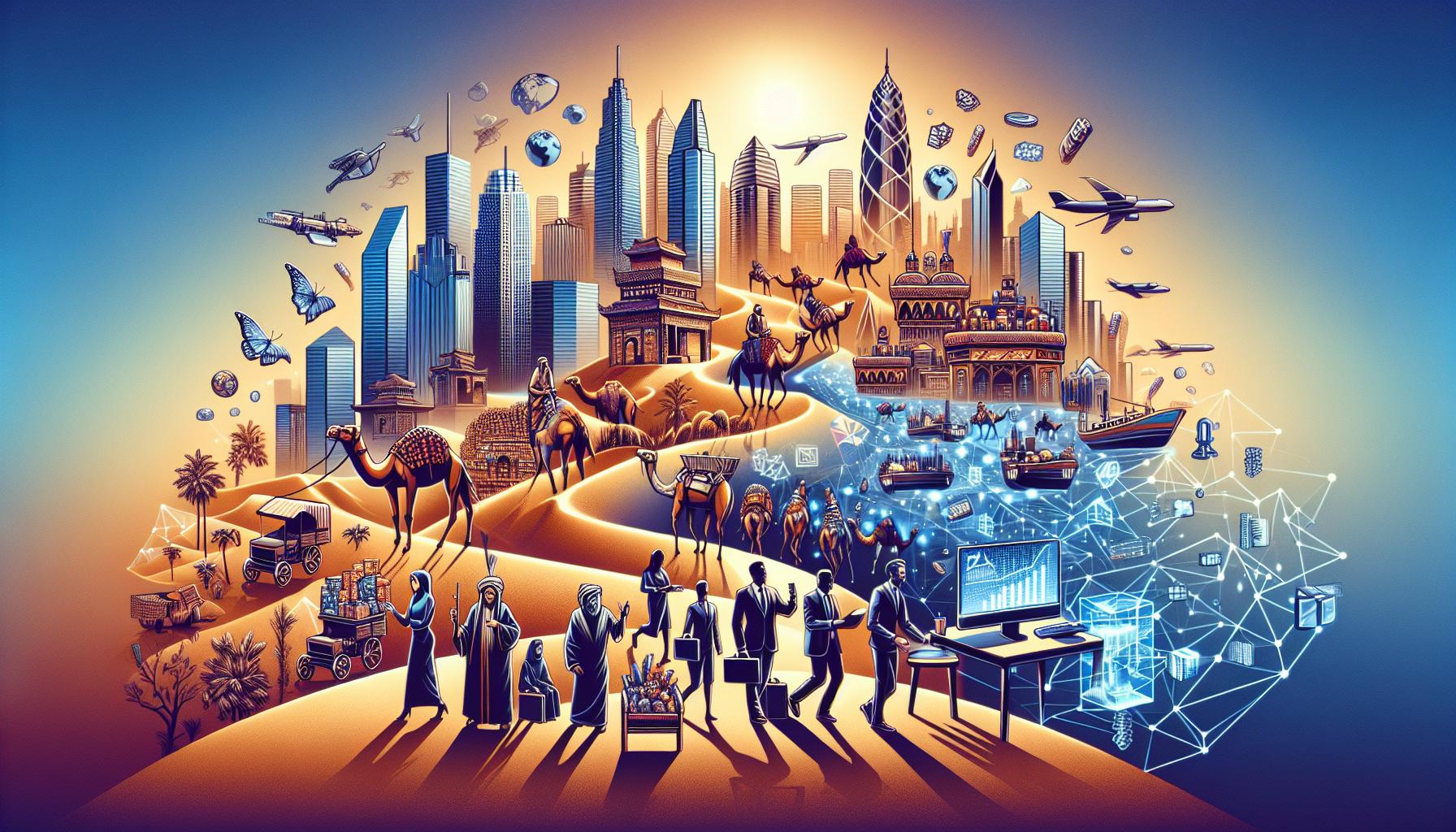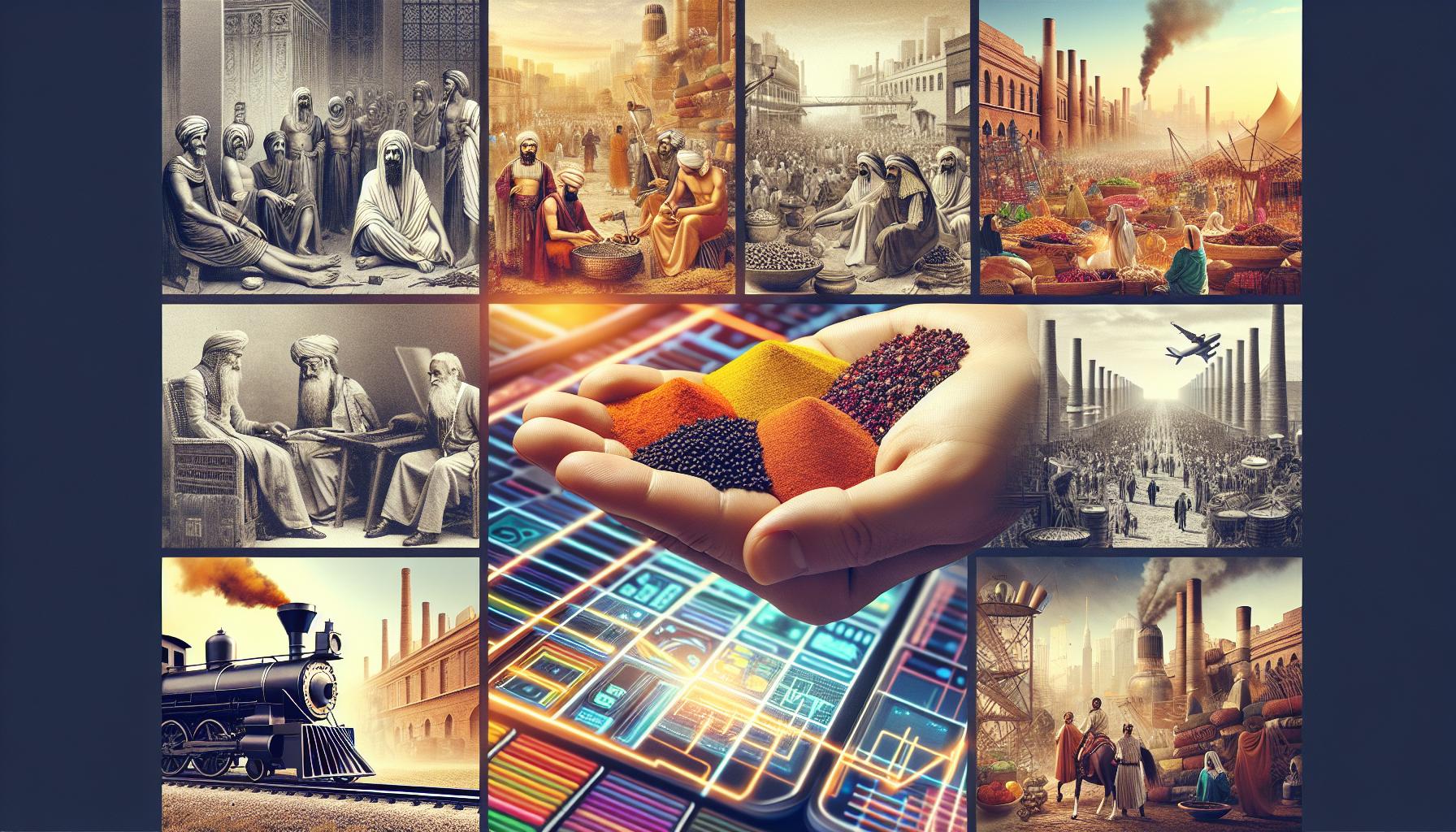Ever wondered how the global market came to be what it is today? “A Splendid Exchange” by William J. Bernstein dives deep into the history of world trade, from the ancient silk roads to today’s complex international markets. It’s a fascinating journey that reveals how trade shaped civilizations and influenced the world we live in now.
I’m Mike Piet, and I’ve spent years dissecting the nuances of economic history and its impact on modern trade. My background in economics, combined with a passion for history, makes me the perfect guide to walk you through Bernstein’s comprehensive exploration. I’ve got the expertise and the insight to break down the complex themes into digestible, engaging tidbits.
Here are three key takeaways from this guide: first, trade has always been a double-edged sword, fostering both cooperation and conflict. Second, the evolution of trade is closely linked to technological advancements. And third, despite its challenges, trade has been a consistent driver of human progress and prosperity. Let’s dive in and explore the rich tapestry of global trade as unfolded by Bernstein.
Overview of “A Splendid Exchange” by William J. Bernstein
When I first picked up A Splendid Exchange, I was looking for a deep dive into the history of global trade, and boy, did it deliver. Bernstein masterfully weaves a narrative that stretches from the ancient spice trade routes to the complexities of modern-day WTO negotiations. For someone like me who loves both economics and history, this was like hitting the jackpot.
One of the most fascinating aspects covered is the Silk Road, not just as a trade route, but as a cultural exchange platform that influenced civilizations from China to Rome. It’s this rich tapestry of stories where you see history come alive — like how a single bolt of silk could weave its way through continents, changing hands and shaping economies.
Bernstein doesn’t shy away from the dark side of trade either. The opium wars are a stark reminder of how trade can be weaponized, leading to devastating consequences. I recall thinking, as I read this section, how history tends to repeat itself with new commodities in the spotlight, echoing conflicts over oil and technology in recent times.
The book also highlights the unsung heroes of trade, like the determined merchants who navigated treacherous seas and landscapes to connect distant worlds. Their stories, often overlooked in the grand narrative of history, bring a human element to the economic theories and data, making the past resonate with the present.
As mentioned, technology plays a key role in shaping trade patterns. Bernstein’s analysis of the steam engine’s impact on 19th-century trade expansion is a compelling account of how innovation drives economic growth. This mirrors today’s digital revolution, where e-commerce platforms are redefining accessibility and market reach.
Finally, A Splendid Exchange lays bare the duality of trade: its power to foster unprecedented wealth and progress, against its capacity to exacerbate inequality and strife. It’s a sobering but necessary reflection on the costs and benefits of global commerce, reminding us that the pursuit of prosperity must also contend with its ethical implications.
Historical Background of World Trade

As I dove into “A Splendid Exchange” by William J. Bernstein, I was struck by the intricate tapestry of world trade’s historical evolution. It’s like uncovering a hidden layer of our past that connects every corner of the globe, from the ancient Silk Road to the digital highways we navigate today.
Navigating the Spice Routes
The spice trade wasn’t just about adding flavor to food; it was a monumental driver of the global economy. Imagine merchants braving vast oceans and treacherous lands just to deliver peppercorns and cinnamon! These expeditions weren’t for the faint-hearted but they laid the groundwork for modern global trade networks. As mentioned, the spice trade epitomized the early connections made between distant societies, fueling not just economic growth but cultural exchange as well.
The Dark Side of Trade
Trade’s underbelly, exemplified by the opium wars, shows how commerce can turn sinister. It’s a stark reminder of the ethical implications tied to our pursuit of wealth and power. This aspect of trade, though uncomfortable, is crucial for understanding the complex, sometimes contentious relationship between nations.
Winds of Change: The Industrial Revolution
The steam engine’s introduction revolutionized trade, compressing time and space. Suddenly, goods could travel faster than ever before, reshaping economies and societies. My own ancestors, who worked in the textile mills of the 19th century, were part of this transformative era that ushered in a new age of manufacturing and commerce.
The Digital Age: A New Frontier
Fast forward to today, and it’s the Internet’s turn to redefine trade. Just as the Silk Road connected ancient civilizations, digital platforms link us instantly with markets thousands of miles away. It’s a game-changer; I’ve seen small businesses go global overnight, thanks to e-commerce portals and digital marketing.
In exploring the lineage of global trade through “A Splendid Exchange,” I’m reminded of how interconnected our world has become. The spice routes of yesteryears have evolved into digital pathways, but the essence of trade — exchange and adaptation — remains unchanged.
Evolution of Global Markets

Ever since I dipped my toes into A Splendid Exchange by William J. Bernstein, I’ve been captivated by the Evolution of Global Markets. It’s like watching the world shrink and expand simultaneously, guided by the invisible hand of commerce.
From Silk to Silicon: A Tale of Transformation
I remember reading about the Silk Road and thinking, “Wow, that’s the OG of global trade networks.” But, as mentioned, it’s the shift from these ancient paths to digital highways that really puts things into perspective. Modern technology has catapulted trade into a realm I like to call the Digital Silk Road.
The Spice That Launched a Thousand Ships
Who would’ve thought that something as simple as pepper could drive the global economy? Yet, during my dive into the spice trade’s impact, I was floored by how nutmeg could practically fund an empire. This tiny spice demonstrates the power of demand and supply on a global scale.
The Dark Side of Trade: A Lesson in Ethics
Trade’s not all sugar, spice, and everything nice, though. Recalling the Opium Wars, it’s clear that greed can turn trade routes into battlegrounds. It’s a stark reminder that with great power comes great responsibility, a lesson that seems to echo through history.
Revolutionizing the Market: Steam to Stream
The Industrial Revolution, especially the introduction of the steam engine, was like hitting the fast-forward button on trade. Fast forward to today, and it’s the internet’s turn to revolutionize trade. My fascination lies in how these technological leaps shrink distances and expand markets.
Navigating the Digital Marketplace
As an avid online shopper, I’ve witnessed the transformation of the digital marketplace first-hand. From eBay hunts to Amazon Prime days, the convenience and reach of online shopping illustrate the digital age’s impact on trade. It’s like the whole world’s at your doorstep, waiting with a delivery.
Trade’s Future: An Uncharted Map
Experts predict that with advancements in AI and blockchain technology, we’re on the verge of another leap in global trade. Imagine secure, efficient trade transactions without the need for intermediaries. We’re looking at a future where trade might just become the most immersive experience yet.
Impact of Trade on Civilizations

Remember how I talked about the Silk Road and the Digital Silk Road? Let’s deep dive into how trade has essentially shaped the civilization tapestries we’re part of today. The influence of trade on civilizations is like the plot of my favorite thriller: full of unexpected twists and immensely impactful.
Trade: The Great Civilizer
I’ve always been fascinated by the concept that trade didn’t just exchange goods but ideas, cultures, and innovations. Consider the Ancient Egyptians, for instance. Their trade expeditions for cedar wood and ebony not only built their empire but also blended their society with others, embedding mutual respect for varied cultures.
Spices, Silk, and Society
Who knew that nutmeg could topple governments, right? But it did. The quest for spices like nutmeg and pepper led to the exploration of new worlds. I remember reading a line by an expert that said, “Spices didn’t just flavor food; they flavored history.” This couldn’t be truer. The wealth generated from the spice trade funded cities, naval expeditions, and even wars. It’s mind-blowing how something as simple as wanting your food to taste better could lead to monumental changes in global dynamics.
Iron, Steam, and Innovations
Let’s not forget the Industrial Revolution. This era was the Netflix binge-worthy sequel to the historical drama of trade. The invention of the steam engine and the advancement in iron production didn’t just amp up production rates; they revolutionized transportation. Suddenly, goods weren’t taking months to travel. The world got a lot smaller, markets expanded, and civilizations underwent a metamorphosis that led us into modern society.
Digital Age: A New Frontier
In my life, I’ve seen the transition to the digital marketplace, and it’s like we’ve started trading on a new Silk Road, but without the camels. The digital age has not just made buying and selling easier but has democratized access to markets. Someone sitting in a small town can sell to someone across the globe. It’s a powerful reminder of how trade continues to be a catalyst for change and connection.
Conclusion
Diving into “A Splendid Exchange” has been an eye-opening journey for me. It’s fascinating to see how trade has always been the backbone of civilization, pushing us toward progress and innovation. From the ancient spice trades to the digital revolution, it’s clear that our desire to connect and exchange has shaped the world in unimaginable ways. This book not only broadened my understanding of global commerce but also made me appreciate the interconnectedness of our histories and futures. It’s a reminder that behind every product, there’s a story of exchange, culture, and human ambition. If you’re curious about the forces that have molded our society, this read is definitely for you.
Frequently Asked Questions
What impact has trade had on civilizations?
Trade has profoundly shaped civilizations by facilitating the exchange of goods, ideas, cultures, and innovations. Throughout history, this exchange has fostered mutual respect among diversified cultures and contributed to societal advancements.
How did ancient civilizations, like the Egyptians, benefit from trade?
Ancient civilizations, including the Egyptians, greatly benefited from trade by integrating with others, which allowed them to acquire new goods, ideas, and technologies. This integration fostered a culture of mutual respect and understanding among diverse groups.
What role did spices like nutmeg play in global dynamics?
Spices such as nutmeg played a crucial role in global dynamics by driving exploration and trade. The pursuit of spices like nutmeg led to the discovery of new lands and monumental changes in history, including the establishment of trade routes and colonial empires.
How did the Industrial Revolution transform trade?
The Industrial Revolution transformed trade by revolutionizing transportation and expanding markets. Innovations like the steam engine made it possible to move goods more efficiently and at a lower cost, which opened up new opportunities for trade on a global scale.
What is the significance of the digital age in global commerce?
The digital age has been transformative in global commerce by democratizing access to markets. It has served as a catalyst for change and connection, making it easier for people to buy and sell goods worldwide, thus revolutionizing how trade is conducted in modern society.


